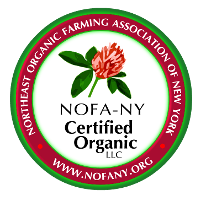Crops
Vegetable Production
Producing a wide range of diversified vegetables on around 30 acres each year, the growing season is a balance between the sustenance that the land can provide for us and what we can give back to the land.
An intensive cover crop rotation and reduced tillage approach helps build organic matter. Generous compost additions help nurture biological activity back to the soil. Our reduced tillage initiatives are working to preserve our most valuable resource – the soil. And each year the land gives back to us hundreds of thousands of pounds of produce, the majority of which is used to supply local produce and value-added goods within the local emergency feeding system. In addition, our 24,000 square feet of greenhouse space also provides the community with fresh greens all winter long.
Vegetable distribution at the Farm Hub doesn’t end when the short days and cold temperatures set in. In fact, about half of the produce we grow is distributed between November and March. Much of our growing season is spent tending to the crops that will be harvested in the fall, stored in our wash and pack facility, and distributed during these winter months when growing food outdoors is not possible.
Field Crops Production
In the field crops rotation, wheat, dry beans, grain corn, soybeans, peas, and cover crops are systematically moved across 800-hundred acres of our NOFA-NY certified organic farmland each year.
Using soil-improving no-till methods, approximately 25% of these crops are planted into rolled and crimped cover crops, and that number is increasing each year. The field crops rotation comprises a large majority of the farmed acreage at the Farm Hub, and we are continually working to reduce tillage and boost soil health on those fields. As weather patterns become less predictable and extreme weather more common, soil-building regenerative practices become more important than ever for the future of our region’s food supply.
After harvest, the field crops are cleaned and stored in our granary facility, before being distributed to our partner organizations within the region. Much of the wheat and grain corn are milled locally into flour or cornmeal by our partner organization Milestone Mill; the popcorn is used to produce BjornQorn, a Hudson Valley popcorn product made about 15 minutes down the road; the dry beans are donated into the regional emergency feeding system or sold to buyers within New York state; and the grain corn, peas, and soybeans are used are used by local mills to produce organic animal feed that is sold here in the Hudson Valley, all within 50 miles of the farm.
Organic certification
The Farm Hub is United States Department of Agriculture (USDA) certified organic through NOFA-NY.


